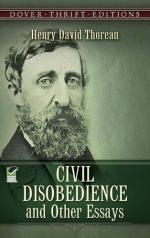|
This section contains 540 words (approx. 2 pages at 400 words per page) |

|
Slavery in Massachusetts Summary and Analysis
"Slavery in Massachusetts" is an Independence Day address given at an anti-slavery meeting in Framingham, Massachusetts. It comes just a month after a Boston judge, Edward Loring, has ruled that a former slave named Anthony Burns should be returned to his former owner in Virginia. While Burns is being held, a party attacks the Boston Courthouse in an attempt to free him. Their attack is unsuccessful and martial law is imposed to restore order. Thoreau's address is a condemnation of Loring and the state government of Massachusetts and a call for a more principled form of government, and praises the "heroic" attack on the courthouse.
Thoreau first refers to a previous anti-slavery meeting at which he was asked to speak. This meeting was mostly about the Kansas-Nebraska Act, which he found to be disappointing, he tells his...
(read more from the Slavery in Massachusetts Summary)
|
This section contains 540 words (approx. 2 pages at 400 words per page) |

|




